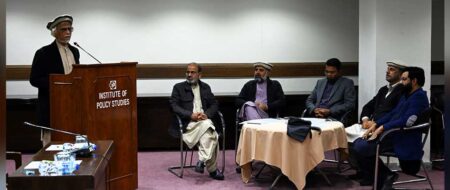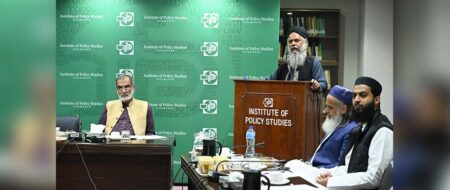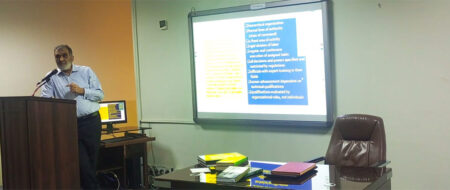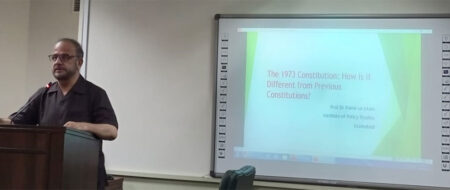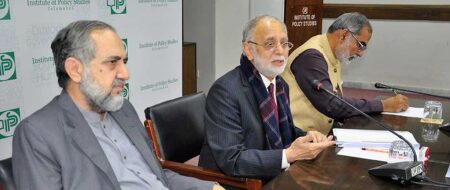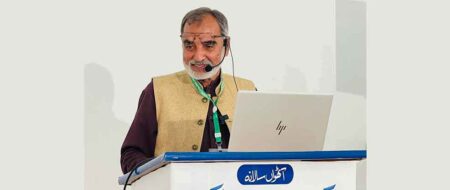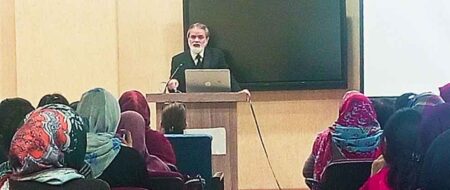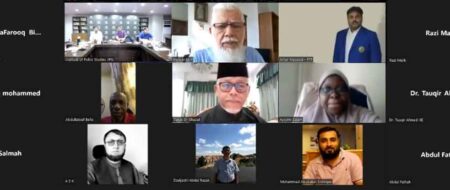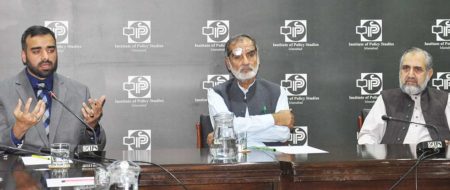Delivering his lecture on ‘China of Today and Tomorrow: Dynamics of Relations with Pakistan,’ Former Secretary General Ministry of Foreign Affairs Mr. M. Akram Zaki maintained rapid and homogeneous progress of People’s Republic of China in all fields during past sixty years under its indigenous agenda had a number of lessons, not only for Pakistan and other developing countries but also for major powers of the world. The seminar was jointly hosted by Institute of Policy Studies, Islamabad and Pakistan Study Centre, Sichuan University, Chengdu, China.
Delivering his lecture on ‘China of Today and Tomorrow: Dynamics of Relations with Pakistan,’ Former Secretary General Ministry of Foreign Affairs Mr. M.
Akram Zaki maintained rapid and homogeneous progress of People’s Republic of China in all fields during past sixty years under its indigenous agenda had a number of lessons, not only for Pakistan and other developing countries but also for major powers of the world. The seminar was jointly hosted by Institute of Policy Studies, Islamabad and Pakistan Study Centre, Sichuan University, Chengdu, China.

Mr.
Akram Zaki highlighted different phases of recent Chinese history through which it had emerged from a “war-ravaged, poor and feudal-colonial society” to the third largest economic power of the world. Recalling different phases of political history of the People’s Republic he underlined that based on the available resources and realistically calculated facts, the leadership of china had been successful in devising a long term policy for overall progress and pursuing it with commitment and determined efforts. Blending together the nationalist, communist and capitalist models, “China has evolved a system that is best suited to its needs, objectives and circumstances.”
Chairman Mao Zedong and Deng Xiaoping, led China for half a century, through two phases of (1) Revolution and consolidation of Independence (2) Modernization. Later China adopted “Marxism-Leninism, Mao Zedong Thoughts and Deng Xiaoping Theory” as the guiding principle under Jiang Zemin. Currently the great Chinese People, under their Fourth Generation Leadership, with Hu Jintao as the core, were progressing fast with Scientific Development Perspective as the current guiding ideology. The continuity of policies and homogeneity of vision had borne its fruits and today China stands firmly as a ‘symbol of stability and sustained progress not only for the region but for the world at large’.

Through careful planning and determined implementation of its plans, China had been making rapid strides in economic and social development and giving a better quality of life to its people. The power, in China, no longer flew from the barrel of the gun, but from the moving wheels of industry and the creative urge of its people to harness new technology for the service of man and mankind. “China’s current GDP is $4.2 trillion and China’s Foreign Exchange Reserves are over $2 trillion,” he noted.
Mr. Zaki maintained that foreign policy of China had remained focused on safeguarding independence and peace at home and abroad. Since China opened up to the outside world under the leadership of Deng Jiaoping , it had maintained low profile foreign policy and did not assume lead-role in international politics. “Now as China has gained economic strength and prestige, it has begun to follow a more active policy in international affairs to develop the concept of Comprehensive Power.”
He also spelt out the evolution of Sino-Pak relations and maintained that both countries had consistently shown an unprecedented concurrence of opinions on all issues on regional and international concern. During 2000 to 2009, nearly 200 MoUs and agreements had been signed between the two countries. As the leadership of both states realize that they needed an effective mechanism to ensure implementation of these agreements, it was decided that both Pakistan and China would set-up special committees and the President of Pakistan and the Premier of China would personally supervise the progress regarding the implementation of the mutual agreements. He stressed that at a time when economic relations were taking the central stage between nations, “Pakistan-China friendship needs further impetus to sustain and to develop it in future.”
Earlier Director General of Institute of Policy Studies
Khalid Rahman said that mutual trust and confidence, cooperation and friendship between two nations and love between the two peoples had no parallel in the recent history of bilateral relations, despite the fact that the two countries followed two different political and social systems. He emphasized greater understanding of two nations about each other, knowing and building on the commonalities and respecting the points of divergence was realized at every level of contact.
Speaking on behalf of Prof. Chen Ji dong, Director, Pakistan Study Centre, Sichuan University, China, Dr. Huang said that China’s foreign policy of today and tomorrow, based on the idea of harmonious world, was to: view security in a broader perspective, maintain world peace and stability; view development in a more holistic perspective; engage in cooperation in a more open attitude, work for mutual benefit and win-win outcome, and to be more tolerant to one another and live together in harmony.

Concluding the proceedings, former Chief Economist Mr.
Fasihuddin reviewed the past and recent milestones achieved by China and expressed his belief that China would lead the world economy more robustly in very near future. He iterated that China needed to play its role not only in the management of existing international financial institutions like WTO, World Bank and IMF but also lead the developing countries for new arrangements and restructuring efforts. He called upon Chinese leadership to play a proactive role in devising mechanism to control greenhouse effects along with remolding its role in the global power politics.
The proceeding of the lecture in Chinese language have been reported on www.people.com.cn website, that can be accessed on
伊斯兰堡政策研究所举行中巴关系动态研讨会
 Mr. Akram Zaki highlighted different phases of recent Chinese history through which it had emerged from a “war-ravaged, poor and feudal-colonial society” to the third largest economic power of the world. Recalling different phases of political history of the People’s Republic he underlined that based on the available resources and realistically calculated facts, the leadership of china had been successful in devising a long term policy for overall progress and pursuing it with commitment and determined efforts. Blending together the nationalist, communist and capitalist models, “China has evolved a system that is best suited to its needs, objectives and circumstances.”
Mr. Akram Zaki highlighted different phases of recent Chinese history through which it had emerged from a “war-ravaged, poor and feudal-colonial society” to the third largest economic power of the world. Recalling different phases of political history of the People’s Republic he underlined that based on the available resources and realistically calculated facts, the leadership of china had been successful in devising a long term policy for overall progress and pursuing it with commitment and determined efforts. Blending together the nationalist, communist and capitalist models, “China has evolved a system that is best suited to its needs, objectives and circumstances.” Through careful planning and determined implementation of its plans, China had been making rapid strides in economic and social development and giving a better quality of life to its people. The power, in China, no longer flew from the barrel of the gun, but from the moving wheels of industry and the creative urge of its people to harness new technology for the service of man and mankind. “China’s current GDP is $4.2 trillion and China’s Foreign Exchange Reserves are over $2 trillion,” he noted.
Through careful planning and determined implementation of its plans, China had been making rapid strides in economic and social development and giving a better quality of life to its people. The power, in China, no longer flew from the barrel of the gun, but from the moving wheels of industry and the creative urge of its people to harness new technology for the service of man and mankind. “China’s current GDP is $4.2 trillion and China’s Foreign Exchange Reserves are over $2 trillion,” he noted. Concluding the proceedings, former Chief Economist Mr. Fasihuddin reviewed the past and recent milestones achieved by China and expressed his belief that China would lead the world economy more robustly in very near future. He iterated that China needed to play its role not only in the management of existing international financial institutions like WTO, World Bank and IMF but also lead the developing countries for new arrangements and restructuring efforts. He called upon Chinese leadership to play a proactive role in devising mechanism to control greenhouse effects along with remolding its role in the global power politics.
Concluding the proceedings, former Chief Economist Mr. Fasihuddin reviewed the past and recent milestones achieved by China and expressed his belief that China would lead the world economy more robustly in very near future. He iterated that China needed to play its role not only in the management of existing international financial institutions like WTO, World Bank and IMF but also lead the developing countries for new arrangements and restructuring efforts. He called upon Chinese leadership to play a proactive role in devising mechanism to control greenhouse effects along with remolding its role in the global power politics.




